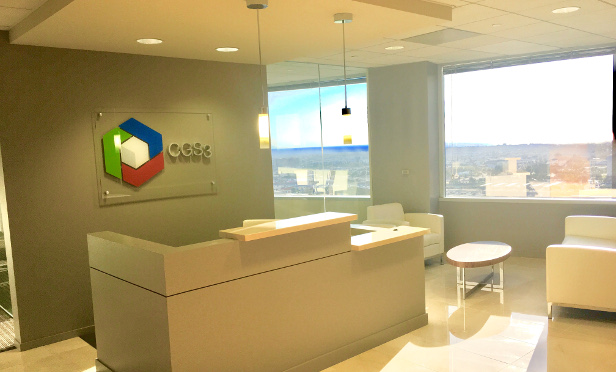
SAN DIEGO—Myriad factors—including shifting demographics and advances in law-related and other technologies—are causing law firms to rethink their space requirements, Crosbie Gliner Schiffman Southard & Swanson LLP partner Sean Southard tells GlobeSt.com.
CGS3, a commercial real estate law firm with a burgeoning practice, has been in an expansion mode since its inception and is rethinking traditional underlying assumptions about law-firm office space. To accommodate its rapidly growing platform in California, the firm recently expanded its San Diego headquarters and relocated and expanded its Los Angeles office.
We sat down with Southard to discuss the evolution of the legal landscape in this country, touching on how myriad factors—including shifting demographics and advances in law-related and other technologies—are causing law firms to rethink office space requirements.

GlobeSt.com: Can you recap your firm's recent expansions?
Southard: In the four-and-a-half years since its inception, our firm has experienced incredible growth, adding Los Angeles offices, growing from seven attorneys and one paralegal to 23 attorneys and five paralegals. To accommodate these new professionals, in early 2017 we expanded our San Diego office to approximately 10,000 square feet. More recently—after adding two new Los Angeles partners—we moved from Brentwood to the Tower located at 10940 Wilshire Blvd. in Westwood. We approached our expansion differently, however, with a view toward reducing leasable area and maximizing the efficiency of space through smart outsourcing and elimination of any concept of recognizing seniority through office entitlements.
GlobeSt.com: How do you envision the law office of the future?
Southard: As with many other industries, the shift in the legal industry is to more open, airy and creative and smaller spaces, which encourage collaboration and interaction. Many law firms will be reducing their needs for larger rentable area by outsourcing administrative functions and leveraging technology to encourage employees to work remotely, thereby eliminating interior offices traditionally required for in-house staff, word processing, file storage and libraries. Gone also are the days of stodgy, traditional law offices that recognize seniority with larger offices—tomorrow's offices will be sleek, modern, efficient and tech oriented. Of course, because of client privacy concerns and privilege issues (and unlike tech companies), law firms will most likely always need to have doors on attorney offices. The more competitive law firms, however, are finally understanding sophisticated clients do not want to pay fees that support law firms occupying trophy space in landmark buildings. We have kept this in mind with all of our expansions, with offices that are modest, tech-forward, open and egalitarian. We don't pay much attention to law-firm hierarchy and provide every attorney with similarly sized private offices.
GlobeSt.com: Will law firms lease fewer square feet in the future? Why?
Southard: Yes—law office footprints are indeed shrinking. Today's more forward-thinking law firms are leveraging technology and reducing overhead by outsourcing back-office functions and relying on creative staffing solutions. Cultural changes are also very important. The demise of the importance of “face time” at the office impels firms to embrace the use of flex-time, part-time and non-partner-track lawyers as well as offering remote working options. Firms are also leasing flexible office space that can be easily be adjusted/broken into smaller or bigger units as necessary. As an example, our use of cloud-based data storage, cloud-based document-management systems and electronic legal research means our offices have no libraries, file rooms or server rooms. Our conference rooms are configurable to meet changing occupancy demands and allow cutting-edge video conferencing and electronic presentations. In terms of location, we want to be in a class-A office space, but our build-out reflects our business focus on reducing costs and lowering overhead, which translates into lower fees for our clients.
GlobeSt.com: How is technology impacting the legal profession and its office needs?
Southard: Emerging technologies have affected every aspect of the legal profession, from billing to document management to client communications. As an example, electronic billing is replacing paper invoices and increases each attorney's efficiency in handling administrative tasks. Electronic filing and communication options provide faster turnaround to clients and reduce ancillary costs usually incurred for mailing and messaging documents. Moreover, technology has emerged as a key marketing tool, with new law-firm websites, social media and video blogs playing an increasingly prominent role.
New electronic document-management systems have revolutionized how legal documents are handled, with firms now storing case files electronically and utilizing databases to track, edit, distribute and archive documents. At CGS3, we use a secure online storage system for everything and pride ourselves on being a “paperless” environment. Being “paperless” translates into smaller offices because we have eliminated paper-driven support systems such as printer/copier rooms and mailrooms that are typically found in traditional law-firm-office layouts.
GlobeSt.com: What's unique about the way law firms are using or being affected by technology?
Southard: The law is a research and data-driven industry. Additionally, the industry presents a multitude of security and confidentiality issues—technology has allowed the ability to track documents and information via metadata, etc. We use advanced software that scrubs metadata on all outgoing email and attachments further ensuring the security and confidentiality of all matters we handle for our clients. CGS3 also utilizes cutting-edge document-review platform software with built in analytics for our litigation matters. This allows our litigation practice group to isolate key documents and review large amounts of data much more quickly resulting in significant savings on fees to our clients.
One key way the business law has been affected by technological change is the ability to work remotely. At CGS3 every attorney is afforded the opportunity to work from the office or home. We utilize laptop computers and partner with our attorneys to create a virtual office at their home. Additionally, our cloud-based document management and billing software systems provide maximum flexibility and support to our service providers, thereby, empowering them to focus on providing best-in-class service to our clients in terms of work-product quality and responsiveness. By making it convenient for our attorneys to work from any environment, CGS3 is able to differentiate itself from other law firms by being a better value provider that can move as quickly as the deals we work on demand.
© 2025 ALM Global, LLC, All Rights Reserved. Request academic re-use from www.copyright.com. All other uses, submit a request to [email protected]. For more information visit Asset & Logo Licensing.







